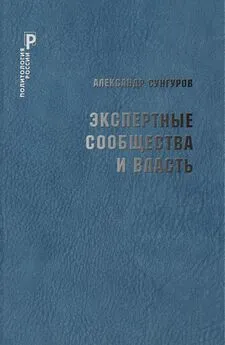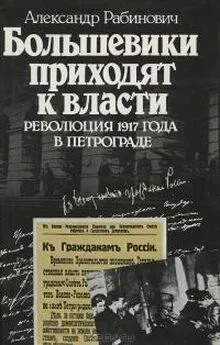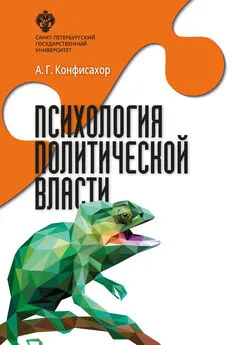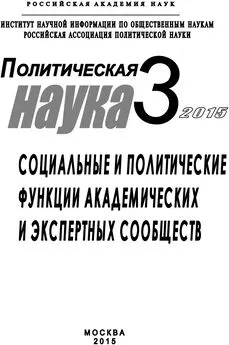Александр Сунгуров - Экспертные сообщества и власть
- Название:Экспертные сообщества и власть
- Автор:
- Жанр:
- Издательство:неизвестно
- Год:неизвестен
- ISBN:978-5-8243-2394-8
- Рейтинг:
- Избранное:Добавить в избранное
-
Отзывы:
-
Ваша оценка:
Александр Сунгуров - Экспертные сообщества и власть краткое содержание
Автор надеется, что книга окажется полезной всем тем ученым, студентам и практикам, желающим разобраться, почему так сложно развивается конструктивное влияние экспертного сообщества на принятие властных решений современной России.
В формате PDF A4 сохранен издательский макет книги.
Экспертные сообщества и власть - читать онлайн бесплатно ознакомительный отрывок
Интервал:
Закладка:
Конец ознакомительного фрагмента.
Текст предоставлен ООО «ЛитРес».
Прочитайте эту книгу целиком, на ЛитРес.
Безопасно оплатить книгу можно банковской картой Visa, MasterCard, Maestro, со счета мобильного телефона, с платежного терминала, в салоне МТС или Связной, через PayPal, WebMoney, Яндекс.Деньги, QIWI Кошелек, бонусными картами или другим удобным Вам способом.
Примечания
1
Словарь основных уголовно-процессуальных понятий и терминов / Баранов А.М., Марфицин. http://www.lawtech.agava.ru/pub/buppdic.htm П.Г.
2
Wall-street Journal. New York.16.11.1998.
3
Братченко С.Л. Мир экспертизы – попытка определения координат… // Экспертиза в социальном мире: от знания к деятельности / под ред. Г.В. Иванченко, Д.А. Леонтьева. М., 2006. С. 63.
4
Сетевая экспертиза. 2-е изд / под ред. чл.-к. РАН Д.А. Новикова, проф. А.Н. Райкова. М., 2011. С. 9.
5
Эти исследования был поддержаны грантом РГНФ/РФФИ № 16-03-00089, а также грантами Президента РФ через оператора – движение «Гражданское достоинство».
6
Вернер Й. Пацельт. Методы политической науки // Методические подходы политологического исследования и метатеоретические основы политической теории. Комментированное введение / сост. К. Конеген, К. Шуберт. М., 2004. С. 133–165.
7
Polanyi M. 1958. Personal Knowledge. London: Routledge and Kegan Paul; Polanyi, Michael. 1962. The Republic of Science, Its Political and Economic Theory // Minerva. № 1. Р. 54–73; Fleck L. Genesis and Development of a Scientific Fact. Chicago, 1979 (translated from the 1935 edition printed in German); Holzner B., Marx John H. Knowledge Application: The Knowledge System in Society. Boston, 1979.
8
Heclo H. Modern Social Politics in Britain and Sweden: From Relief to Income Maintenance. New Haven, 1974. P. 305
9
Hall P.A. Conclusion: The political power of economic ideas // P.A. Hall, ed. The Political Power of Economic Ideas: Keynesianism Across Nations. Princeton, 1989. P. 361–392; Etheredge Lloyd S. Government learning: An overview // S.L. Long, ed. The Handbook of Political Behavior. Vol. 2. New York, 1981; Richard R. What is lesson-drawing // Journal of Public Policy. 1991. 11. P. 3–30; May P.J. Policy Learning and Failure // Journal of Public Policy. Vol. 12. № 4. Oct. – Dec., 1992. P. 331–354.
10
Сунгуров А.Ю. Как возникают политические инновации: «фабрики мысли» и другие институты-медиаторы. М., 2015. Гл. 3.
11
Dunlop Claire A., Radaelli C.M. Systematising Policy Learning: From Monolith to Dimensions // Political Studies. 2013. Vol. 61. P. 599–619.
12
Sabatier P., Jenkins-Smith H. (eds). Policy Change and Learning: An Advocacy Coalition Approach, Boulder, CO: Westview Press; 1993; Sabatier P., Jenkins-Smith H. The advocacy coalition framework: an assessment // Sabatier P. (ed.). Theories of the Policy Process, Boulder, CO, 1997; Sabatier P.A. The advocacy coalition framework: revisions and relevance for Europe // Journal of European Public Policy. 1998. Vol. 5. № 1. Р. 98–130.
13
Peter M. Haas. Introduction: epistemic communities and international policy coordination // International Organization Vol. 46. № 1; Knowledge, Power, and International Policy Coordination. Winter, 1992. P. 1–35; Davis Cross М.К. Rethinking epistemic communities twenty years later // Review of International Studies Vol. 39. № 1. January 2013. Р. 137–160.
14
Knorr-Cetina K. 1999. Epistemic Cultures: How the Sciences Make Knowledge. Cambridge: Harvard University Press; Dunlop C.A. Epistemic Communities and Two Goals of Delegation: Hormone Growth Promoters in the European Union // Science and Public Policy 2010. № 37 (3). Р. 205–17; Makarychev А. PONARS as a transnational epistemic community: An Insider’s View // Problems of Post-Communism. Vol. 59. № 2. March/April 2012. P. 4350; Loblova О. When Epistemic Communities Fail: Exploring the Mechanism of Policy Influence // The Policy Studies Journal Vol. 46. № 1. 2018. P. 160–189. doi: 10.1111/psj.12213.
15
«Scientists should be on tap not on top». Цит. по: Rogers M.D. The European Commission and the collection and use of science and technology advice // The Politics of Scientific Advice: Institutional Design for Quality Assurance / еd. by J. Lentsch and P. Weingart. Cambridge, 2011. P. 115.
16
Сунгуров, 2015; Балаян А.А., Сунгуров А.Ю. Фабрики мысли и экспертные сообщества. СПб., 2016.
17
Sarewitz D. Looking for quality in the wrong places, or: the technological origin of quality in scientific policy advice // The Politics of Scientific Advice: Institutional Design for Quality Assurance / еd. by J. Lentsch and P. Weingart. Cambridge, 2011. P. 54–70; Sarewitz D. How science makes environmental problems controversies worse // Environmental Science and Policy. 2004. № 7. Р. 385–403.
18
Oreskes N. Reconciling representation with reality: unitization as example for science and public policy // The Politics of Scientific Advice: Institutional Design for Quality Assurance / еd. by J. Lentsch and P. Weingart. Cambridge, 2011. P. 36–53.
19
Кун Т. Структура научных революций. М., 1986.
20
Oreskes N. Science and public policy: what’s proof got to do with it? // Environmental Science & Policy. 2004. № 7. Р. 369–383.
21
Gieryn T.F. Boundary-work and the Demarcation of Science from Non Science: Strains and Interests in Professional Ideologies of Scientists //American Sociological Review. 1983. Vol. 48. № 6. P. 781–795.
22
Sabatier P.A. The Acquisition and Utilization of Technical Information by Administrative Agencies // Administrative Science Quarterly. 1978. № 23. Р. 396–417; Weiss C.H. Research and Policy-Making: A Limited Partnership // F. Heller (ed.). The Use and Abuse of Social Science. Sage: London, 1986. P. 214235; Radaelli C.M. The Role of Knowledge in the Policy Process // Journal of European Public Policy. 1995. Vol. 2. № 2. Р. 159–183.
23
Feldman M.S. and March J.G. Information in Organizations as Signal and Symbol // Administrative Science Quarterly. 1981. № 26. Р. 171–86; March J.G. Decisions and Organizations. Oxford, 1988.
24
Boswell C. The political functions of expert knowledge: Knowledge and legitimation in European Union Immigration Policy // Journal of European Public Policy. Vol. 15. № 4. May 2008. P. 4721–4788; idem. The Political Uses of Expert Knowledge: Immigration Policy and Social Research, 2009.
25
Brunsson N. The Organization of Hypocrisy: Talk, Decisions and Actions in Organizations. Copenhagen, 2002.
26
Hunter A., Boswell C. Comparing the Political Functions of Independent Commissions: the Case of UK Migrant Integration Policy // Journal of Comparative Policy Analysis, 2015. Vol. 17. № 1. Р. 10–25.
27
Jasanoff Sh. The Fifth Branch: science Advisers as policymakers. Cambridge, MA: Harvard University Press, 1990; idem. States of Knowledge: The Coproduction of Science and Social Order. London, UK: Routledge, 2004; idem. Designs of Nature, 2005.
28
Idem. Science at the bar: law, science, and technology in America. Cambridge, Massachusetts, and London, England, 1997. P. XV.
29
Jasanoff Sh. Quality control and peer review in advisory science // The Politics of Scientific Advice: Institutional Design for Quality Assurance / еd. by J. Lentsch and P. Weingart. Cambridge, 2011. P. 19–35.
30
Guston D.H. Stabilizing the boundary between U.S. politics and science: The role of the Office of Technology Transfer as a boundary organization. Social Studies of Science. 1999. Vol. 29. № 1. Р. 87–112; Guston D.H. Boundary Organizations in Environmental Policy and Science: An Introduction // Science, Technology, & Human Values Vol. 26. № 4. Special Issue: Boundary Organizations in Environmental Policy and Science. Autumn, 2001. P. 399–408.
31
Hellström T., Jacob M. Boundary organizations in science: From discourse to construction. Science and Public Policy. 2003. Vol. 30. № 4. Р. 235–238; Medvetz Т. Murky Power: «Think Tanks» as Boundary Organizations // Rethinking Power in Organizations, Institutions, and Markets Research in the Sociology of Organizations. 2012. Vol. 34. Р. 113–133; Parker J., Crona В. On being all things to all people: Boundary organizations and the contemporary research university // Social Studies of Science April 2012. Vol. 42. № 2. 262289; Hoppe R., Wesselink A., Cairns R. Lost in the problem: the role of boundary organisations in the governance of climate change // Wiley Interdisciplinary Reviews: Climate Change, July/August 2013. Vol. 4. № 4. P. 283–300.
32
Сунгуров А.Ю. Как возникают политические инновации: «фабрики мысли» и другие институты-медиаторы. М., 2015.
33
Он же. Организации-посредники в структуре гражданского общества. Некоторые проблемы политической модернизации России // Полис. 1999. № 6. С. 34–48.
34
Сабатье П., Дженкинкс-Смит Х. Концепция лобби-коалиций: оценка // Публичная политика: от теории к практике / сост. и научн. ред. Н.Ю. Данилова, О.Ю. Гурова, Н.Г. Жидкова. СПб., 2008. С. 94–154.
35
Jasanoff 2011. P. 21.
36
Stone D. Capturing the Political Imagination, Think Tanks and the Policy Process, London: Frank Cass, 1996; Stone D., Denham А., Garnett М. (eds.). Think Tanks Across Nations. A Comparative Approach, Manchester: Manchester University Press, 1998; Stone D., Denham А. (eds.). Think Tank Traditions: Policy Analysis Across Nations; Policy Research and the Politics of Ideas, Manchester: Manchester University Press, 2004; Stone D., Maxwell S. (eds). Global Knowledge Networks and International Development. London: Routledge, 2005.
Читать дальшеИнтервал:
Закладка:










